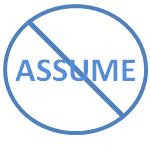A big hulk of a man got on a bus one day, glared at the driver and said, “Big John doesn’t pay!” The small, meek driver was incensed, but didn’t challenge him. This occurred day after day, with the bus driver getting more agitated and beginning to lose sleep over being taken advantage of this way. So, he signed up for body-building courses, karate, judo – in an attempt to stand up to the bully by the end of the summer. The next Monday, when Big John boarded the bus, saying “Big John doesn’t pay!” the bus driver rose and screamed, “Why not?” With a surprised look on his face, Big John replied, “Big John has a bus pass.”
This joke (from the Orange-Peel Gazette) is cute, but also illustrates how quick we all are to make assumptions about others based on their appearance, or even on their (sometimes VERY poor) communication skills. Big John may not have expressed himself properly, but he also meant no malice. However, the bus driver, acting on an assumption, spent time, money and energy (not to mention the stress he caused himself) “fixing” a problem that didn’t exist!
How often do we do things like this in our workplaces (or anywhere in life)? We make assumptions, spend all kinds of effort talking about the problem to EVERYONE we know (wasting their time, too) losing sleep, agonizing over what to do, and spending time and money we cannot afford to solve the problem before we know the true nature of it – or if a problem even exists?
The next time you’re tempted to become offended or intimdated by a particular person or situation, make an assumption on the positive side (assume they are NOT being a bully or a jerk) and attempt one civilized, reasonable conversation with that person by asking the simple and obvious question, “Why do you say that?” or “I don’t understand, please tell me why.” Sometimes the person really is trying to take advantage of the situation, which you will quickly discover. But often a miscommunication and escalation of the situation can be easily avoided by initiating a calm communication with the other person to determine the real nature of the situation.


